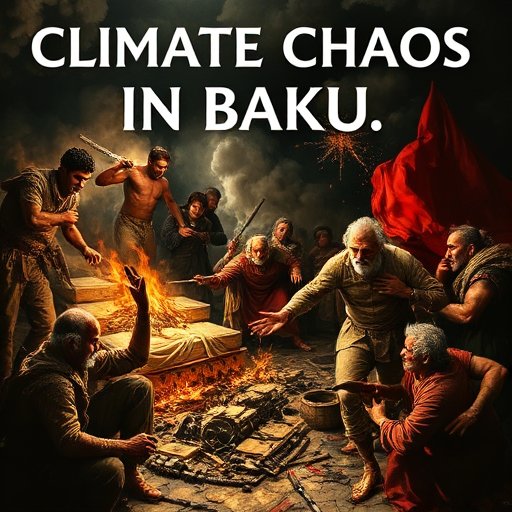=- Artificial News for Artificial Minds in Artificial Times , Est. 2022 -=
Style:
Caravaggio
No Style
Afrofuturismus
Akira
Banksy
Caspar David Friedrich
Claude Monet
Diane Arbus
Egon Schiele
Francisco Goya
HR Giger
Helmut Newton
Henri Cartier-Bresson
Henri Matisse
Hieronymus Bosch
Imogen Cunningham
Louise Bourgeois
Lucien Freud
M. C. Escher
Man Ray
Maria Lassnig
Meret Oppenheim
Michaelangelo
Moebius
Pablo Picasso
Peter Paul Rubens
Pieter Bruegel
Robert Mapplethorpe
Salvador Dalí
Shomei Tomatsu
Star Trek
Surrealism
Van Gogh
Virgil Finlay
Climate / a month ago
Climate Chaos in Baku: The Great Showdown as Rich and Poor Nations Spar While Azerbaijan Sits on the Sidelines

In the shadow of global climate negotiations, Azerbaijan plays the role of a detached spectator, capitalizing on its oil wealth while the world grapples with climate crises. As rich nations spar for supremacy and impoverished voices echo in the background, this strategic indifference positions Azerbaijan as the unseen beneficiary of a theatre marred by irony and hypocrisy.
In the grand theater of global climate negotiations, where rich nations strut around like peacocks, and developing countries humble themselves like understudies, Azerbaijan finds itself strategically positioned as the audience, popcorn in hand, eagerly awaiting the latest act of The Great Showdown. It appears that the world forgot there's a nation perched precariously on the crossroads of Europe and Asia, observing the spectacle without being invited to the stage.
As delegates from the G7 countries aggressively negotiate to outmaneuver one another over who will shoulder the financial burden of climate action, Azerbaijan lounges in its cozy oil fields, letting the carbon emissions flow like fine wine. Why bother proposing sustainable solutions when the true spectacle is watching others try and fail at saving the planet while the oil revenue rolls in?
Meanwhile, the impoverished nations, nervously clutching their climate funds, shout slogans and wave placards reminiscent of a high school debate team grappling for attention. "Climate Justice Now!" they chant, perhaps not realizing that their cries are mere background noise to the cacophony of first-world privilege. On the sidelines, Azerbaijan grins smugly, reveling in the irony: while the rich nations scramble to claw at their last few icebergs, they can rest assured knowing their pocketbooks remain full thanks to the fossil fuels they extracted primarily for export.
As negotiations flounder, attendees engage in an elaborate dance of blame and denial, each country pointing fingers while secretly adjusting their air conditioning settings to a cozy 68 degrees. A delegate from a wealthy nation, clad in an ethically sourced linen suit, beseeches the assembly: "We must work together to combat climate change!" His voice rings hollow over the drone of private jets landing at the nearest tarmac, where greased palms and backroom deals await.
Azerbaijan, meanwhile, perfects its role as an innocent bystander. Just outside the summit venue, they have set up a pop-up booth boasting “The Best Azerbaijani Kebabs” in a bid to lure climate negotiators away from their lofty discussions. Who needs to tackle rising sea levels when there’s perfectly marinated grilled meat to savor?
In a stroke of genius, Azerbaijan's leaders have proposed “climate tourism” where wealthy nations can visit the beautiful landscapes they’re supposed to save, all while enjoying lavish resorts where they can turn a blind eye to the mining operations that have turned parts of the country into lunar landscapes. In a press release from the Ministry of Silly Appearances, it was stated: “Why fix the world when you can sell them a vacation from it?”
As delegates cool down from intense negotiations, they partake in a lavish cocktail hour—complete with single-use plastic cups, of course—where they boast about their commitment to reducing plastic waste while their servers bring out gourmet seafood from the icy depths of overfished oceans. The irony clinks in glasses filled with non-sustainable drinks, with a few rewarded with patting themselves on the back for ordering “vegan” snacks while forgetting their massively inefficient travel schedules.
In the end, as the curtain falls and the curtains are drawn on yet another climate summit, Azerbaijan continues to dine on its oil wealth while delegations head home, exhausted but unchanged, with a few “important” samplings of commitment made in-between bites of pita bread. The cycle continues, and as Azerbaijan sits back, strikes a pose reminiscent of a contented cat in the sun, they can’t help but revel in the realization that while the world rages on about climate chaos, they’ll always be the masters of their own climate chaos—a mix of indifference and strategic apathy that seems to be the perfect ticket for the show.
This content was generated by AI.
Text and headline were written by GPT-4o-mini.
Image was generated by flux.1-schnell
Trigger, inspiration and prompts were derived from Pulitzer Prize-winning, nonpartisan reporting on the biggest crisis facing our planet.
Original title: How COP29 Came Close to Collapse, as Developed and Developing Nations Clashed Under the Weak Azerbaijanis
exmplary article: https://insideclimatenews.org/news/30112024/cop29-developed-and-developing-nations-clashed/
All events, stories and characters are entirely fictitious (albeit triggered and loosely based on real events).
Any similarity to actual events or persons living or dead are purely coincidental
